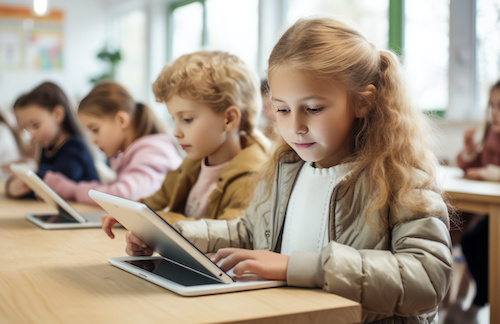Key points:
- Immersive technologies will change education in 2024
- Learn more about K-12 Tech Innovation News
- Discover Current Trends in Education
The year 2024 promises significant changes in K-12 education, reflecting a dynamic evolution in teaching and learning methodologies. Anticipated shifts encompass personalized learning enhanced by adaptive technologies, the continued integration of hybrid learning models, and an intensified focus on digital literacy and coding education.
Education leaders, learning of new trends and changes via national K-12 tech innovation news, are embracing immersive technologies like augmented and virtual reality, ensuring classrooms are poised to become more interactive and engaging. Social-emotional learning gains prominence, recognizing the holistic development of students. Collaboration, project-based learning, and data analytics further contribute to a future-ready educational landscape.
These changes signify a commitment to equipping students with the skills essential for success in the 21st century.
What are the changes in education in 2024?
K-12 education is undergoing significant changes as we look at current trends in education in 2024. Personalized learning, fueled by adaptive technologies, continues to evolve, tailoring instruction to individual student needs. Hybrid learning models, blending in-person and online elements, have become more entrenched, offering flexibility and adaptability.
Technological integration remains a priority, with a focus on digital literacy, coding education, and the incorporation of immersive technologies like augmented and virtual reality. Social-emotional learning takes a central role, recognizing the importance of holistic student development.
Collaborative and project-based learning approaches are gaining prominence, fostering critical thinking and collaboration skills. Learning analytics and data-driven decision-making are becoming integral to education strategies, providing insights into student progress and performance. Ensuring equitable access to technology and addressing the digital divide continue to be crucial, reflecting a commitment to inclusivity in the ever-evolving landscape of K-12 education in 2024.
What are the three biggest issues in education today?
Three significant current trends and issues in education today are:
- Educational Inequity: The persistent disparity in educational opportunities and resources among students, often driven by socioeconomic factors, exacerbates existing inequalities. The digital divide, unequal access to quality teachers, and varying educational infrastructure contribute to disparities in academic outcomes.
- Technology Integration Challenges: While technology offers immense benefits, challenges in integrating it effectively persist. The digital divide widens, hindering some students’ access to online learning. Additionally, issues related to teacher training, digital literacy, and the equitable distribution of technology resources remain prevalent.
- Mental Health and Well-Being: The mental health of students and educators is a growing concern. Academic pressures, social challenges, and the impact of external factors, such as the COVID-19 pandemic, contribute to stress and mental health issues. Addressing the emotional well-being of both students and educators has become a critical aspect of K-12 education.
What are the 5 emerging trends of 21st century education?
Looking ahead at emerging movements, 5 trends in education include:
- Personalized Learning: Tailoring education to individual student needs using adaptive technologies and data analytics, promoting a more customized and effective learning experience.
- STEM Education: A heightened focus on science, technology, engineering, and mathematics (STEM) to equip students with critical skills for a technology-driven future.
- Project-Based and Experiential Learning: Moving away from rote memorization, education is embracing hands-on, real-world projects and experiences to enhance understanding and application of knowledge.
- Social-Emotional Learning: Recognizing the importance of emotional intelligence and interpersonal skills, education is increasingly incorporating SEL to support students’ holistic development.
- Global Citizenship Education: Emphasizing global awareness, cultural competence, and interconnectedness to prepare students for a diverse and interconnected world, fostering empathy and understanding of global issues. These trends collectively reflect a shift towards holistic, adaptive, and future-focused K-12 education paradigms.
What will be the future of education?
Future trends in education point to a dynamic evolution, driven by several key factors.
Personalized learning, fueled by artificial intelligence and adaptive technologies, will become more prevalent, tailoring education to individual student needs. Hybrid learning models, combining in-person and virtual elements, will offer flexibility and resilience in education delivery.
An emphasis on digital literacy, coding education, and immersive technologies like augmented and virtual reality will prepare students for the demands of a technology-centric future. Social-emotional learning will be integral, recognizing the importance of holistic student development.
Collaborative and project-based learning approaches will foster critical thinking and collaboration skills. Learning analytics and data-driven decision-making will provide educators with valuable insights into student progress. Ensuring equitable access to technology and addressing the digital divide will remain critical priorities, reflecting a commitment to inclusivity in the ever-evolving landscape of K-12 education.
Overall, the future holds a vision of adaptable, technology-enhanced, and inclusive K-12 learning experiences.
Conclusion
To embrace the transformative changes in K-12 education in 2024, stay informed, advocate for innovative teaching practices, and support initiatives fostering personalized learning, digital literacy, and collaborative approaches. Educators can work to ensure that education systems are dynamic, inclusive, and equipping students for a future shaped by 21st-century skills.
- Friday 5: Virtual field trips - April 26, 2024
- Google, MIT RAISE launch no-cost AI training course for teachers - April 26, 2024
- 4 ways to support work-based learning - April 23, 2024

